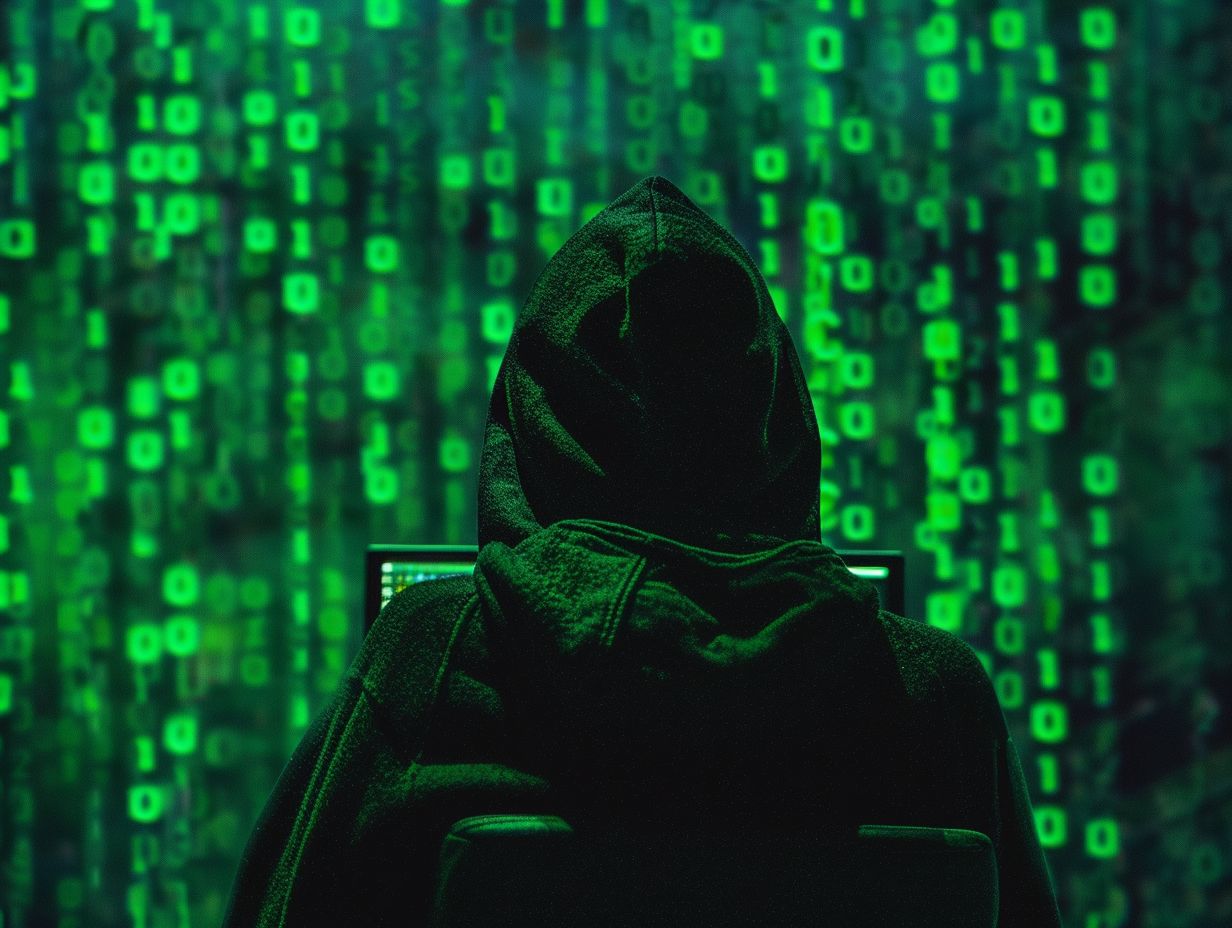Interested in delving into the realm of cybersecurity and understanding the responsibilities of a Certified Ethical Hacker (CEH)?
This article will explore the definition and duties of a CEH, along with the advantages of pursuing this career. From the requisite skills and knowledge for becoming a CEH to exam preparation strategies and opportunities for ongoing education, all essential information for excelling in this profession will be covered.
Let us embark on this journey to uncover the dynamic world of ethical hacking!
Key Takeaways:

What is a Certified Ethical Hacker?
A Certified Ethical Hacker (CEH) is a professional in the cybersecurity field who has achieved the CEH certification. Ethical hackers play a crucial role in organizations by identifying and resolving vulnerabilities in systems to improve security.
They are tasked with performing simulated cyber-attacks to evaluate the resilience of a company’s security infrastructure. By proactively identifying weaknesses and potential points of entry that could be exploited by malicious hackers, CEH professionals assist in strengthening digital defenses before any actual attacks occur.
Their proficiency in penetration testing and ethical hacking techniques enables them to predict and counter emerging cyber threats. Given the increasing complexity of cyber attacks, having CEH professionals on staff is essential for preserving data integrity and safeguarding sensitive information.
Definition and Role in Cybersecurity
In cybersecurity, a Certified Ethical Hacker (CEH) is an accredited professional who utilizes hacking skills for ethical purposes to evaluate the security of IT systems and networks. CEH professionals assist organizations by proactively identifying vulnerabilities and enhancing system security to mitigate potential cyber threats.
Through executing simulated attacks, CEH professionals can replicate the strategies of malicious hackers to pinpoint weaknesses in a system’s defenses. This expertise enables organizations to fortify their security protocols and protect sensitive data from cybercriminals.
CEH professionals play a pivotal role in performing penetration tests to assess the resilience of an organization’s security infrastructure, aiding in maintaining a proactive stance against potential cyber attacks.
Benefits of Becoming a Certified Ethical Hacker
Achieving Certified Ethical Hacker (CEH) certification offers numerous advantages for individuals interested in a cybersecurity career. From competitive salaries to a variety of job opportunities, CEH certification unlocks a multitude of possibilities.
In today’s digital environment, professionals with CEH skills are in high demand as the need for cybersecurity experts continues to rise. With the increasing frequency of data breaches and cybersecurity threats, organizations actively seek proficient CEH professionals to assist in protecting their digital assets. This certification not only boosts one’s credibility in the field but also provides a competitive advantage when pursuing positions in penetration testing, ethical hacking, incident response, and security analysis.
Career Opportunities and Advancement
Earning a CEH certification not only expands your career opportunities but also paves the way for professional advancement in the cybersecurity domain. With the option to specialize further as a CEH Master, you can excel in specific areas of ethical hacking.
By diving into the CEH Master program, professionals like yourself can enhance their expertise in areas such as penetration testing, network security, or incident response, allowing you to become sought-after specialists in the industry. The dynamic nature of cybersecurity requires continuous learning, and the CEH Master program provides a platform for you to stay ahead of evolving threats and technologies. This specialization opens doors to higher-level positions, such as cybersecurity consultants or chief information security officers, demonstrating the value of ongoing education and skill development in this fast-paced field.
Skills and Knowledge Required for CEH

To become a Certified Ethical Hacker, you must possess a combination of technical skills, including expertise in ethical hacking and penetration testing, as well as non-technical skills such as problem-solving abilities and a deep understanding of cybersecurity principles.
Having practical experience is vital for Certified Ethical Hackers to effectively apply their knowledge in both simulated and real-world environments, where they can identify vulnerabilities and propose solutions.
A solid understanding of security frameworks like NIST, ISO/IEC 27001, and CIS Controls is crucial for aligning security practices with industry standards.
The capacity to conduct comprehensive vulnerability assessments, analyze risks, and recommend appropriate countermeasures distinguishes proficient Certified Ethical Hackers in the constantly evolving realm of cybersecurity.
Technical and Non-Technical Skills
Professionals pursuing a career in cybersecurity must possess a set of technical and non-technical skills to excel in roles such as security analysts. Technical skills required for a Certified Ethical Hacker (CEH) include proficiency in ethical hacking methodologies and tools, while non-technical skills encompass critical thinking, problem-solving, and communication abilities. These skills are essential for success in IT security roles, particularly those involving security analysis.
When pursuing a career in cybersecurity, you must not only master the technical aspects but also refine your soft skills. Critical thinking skills will enable you to analyze complex security threats effectively, while problem-solving skills are crucial for addressing vulnerabilities efficiently. Additionally, strong communication skills are essential for clear collaboration with team members and stakeholders. By combining technical expertise with non-technical competencies, CEH professionals can effectively navigate the evolving landscape of cyber threats and make significant contributions to safeguarding sensitive information within organizations.
How to Become a Certified Ethical Hacker
Achieving Certified Ethical Hacker status requires successfully completing the CEH exam, undergoing specialized training, and adhering to the certification process established by industry standards. As a candidate striving for CEH certification, thorough preparation is imperative to excel in the examination.
To commence your journey toward becoming a Certified Ethical Hacker, the initial step involves gaining a comprehensive understanding of the exam objectives and requirements. It is essential to acquaint yourself with the tools and techniques commonly utilized in ethical hacking practices. Engaging in specialized training programs, such as those provided by accredited institutions or online platforms, can offer valuable insights and hands-on experience in the field. Remaining abreast of the latest cybersecurity trends and regularly participating in simulated hacking scenarios can significantly enhance your likelihood of successfully passing the CEH exam.
Training and Certification Process
To obtain a CEH certification, you should consider enrolling in specialized CEH courses offered by EC-Council or participating in ethical hacker bootcamps that provide intensive training on hacking techniques and methodologies. It is crucial for individuals to familiarize themselves with the exam format to increase their chances of successfully obtaining the certification.
These training programs play a vital role in equipping aspiring ethical hackers with the necessary skills and knowledge required to excel in the CEH exam. EC-Council’s structured courses cover a wide range of topics, including penetration testing, vulnerability assessment, and incident response, preparing candidates to handle real-world cybersecurity challenges. Participating in ethical hacker bootcamps offers a hands-on approach to learning, allowing individuals to practice their skills in simulated environments before taking the exam.
Job Responsibilities of a CEH
As a Certified Ethical Hacker (CEH), you are entrusted with critical job responsibilities that involve conducting security assessments, identifying vulnerabilities, and implementing countermeasures to safeguard systems and networks. Your expertise in ethical hacking is paramount in the ever-evolving landscape of the cybersecurity field.
You play a pivotal role in proactively identifying potential weaknesses in an organization s infrastructure through simulated cyber attacks, ensuring that vulnerabilities are addressed before malicious actors exploit them. By staying abreast of the latest cyber threats and security trends, CEH professionals like you can effectively recommend and implement security measures to protect against unauthorized access, data breaches, and other cyber risks.
The CEH examination serves as a stamp of approval, validating your proficiency in the ethical hacking domain and your ability to secure systems from potential threats.
Roles and Responsibilities in the Field

Individuals who possess a CEH certification have the opportunity to explore various job roles within the cybersecurity field, as there is a significant demand for professionals who are well-versed in advanced technologies. Whether you are working as a security analyst or a penetration tester, those who hold a CEH certification are instrumental in protecting organizations from cyber threats.
In today’s rapidly changing landscape of cyber threats, the necessity for skilled cybersecurity professionals has never been more vital. The attainment of a CEH certification not only confirms an individual’s technical abilities but also showcases a profound comprehension of ethical hacking techniques and methodologies. This certification serves as a doorway to compelling career prospects across diverse industries, give the power toing professionals with the confidence necessary to effectively address intricate security challenges. Organizations highly regard individuals with a CEH certification for their capacity to proactively detect vulnerabilities and implement robust security measures to mitigate risks.
CEH Exam Preparation Tips
Preparing for the CEH exam requires you to take a strategic approach that involves utilizing exam vouchers, leveraging resources provided by cybersecurity professionals, and dedicating time to continuous learning. Adopting effective study strategies is essential for success in the certification examination.
Securing exam vouchers can help you reduce costs associated with exam fees, making the preparation process more financially feasible. Seeking guidance from cybersecurity professionals can provide you with valuable insights into the industry’s trends and best practices, further enhancing your knowledge base. Engaging in continuous learning through online courses, practical exercises, and industry events can also help you stay updated on the latest cybersecurity technologies and threats, ultimately boosting your confidence and readiness for the CEH exam.
Study Strategies and Resources
Effective study strategies for the CEH exam involve enrolling in comprehensive CEH courses, practicing for the practical exam to enhance your hands-on skills, and familiarizing yourself with the exam format and technology tools. It is crucial to utilize a variety of resources to master the content required for the certification.
These resources include CEH study guides, practice exams, online training platforms, and virtual labs that simulate real-world scenarios. Engaging with a community of cybersecurity professionals can also provide valuable insights and support.
Understanding the ethical hacking methodology, reconnaissance techniques, and vulnerability analysis are crucial components of the CEH exam. Hands-on practice through labs and simulated challenges can significantly boost your proficiency in identifying vulnerabilities and applying appropriate tools and techniques.
Building a solid foundation in networking concepts, encryption protocols, and security mechanisms is imperative for success in your CEH certification journey.
Continuing Education and Career Growth for CEH
For CEH professionals seeking career growth and specialization in cybersecurity, continuing education is essential. You should consider pursuing advanced certifications like the CEH Master and transitioning into roles such as security analysts to expand your expertise and stay competitive in the rapidly changing cyber security landscape.
By consistently enhancing your skills and knowledge through specialized certifications, you can improve your ability to safeguard organizations from evolving threats. The CEH Master certification provides individuals with advanced skills in ethical hacking, penetration testing, and vulnerability assessment, enabling them to effectively combat sophisticated cyber attacks.
Transitioning into roles like security analysts not only presents greater challenges but also opens up opportunities for higher-paying positions and increased responsibilities in overseeing and enhancing cybersecurity measures. This professional growth can further solidify your position in the cybersecurity field and advance your career.
Advanced Certifications and Specializations
Advanced certifications and specializations, such as the CEH Master program offered through EC-Council training, provide you, as a CEH-certified individual, with opportunities to enhance your skills and knowledge in ethical hacking. Ethical hacker bootcamps are also instrumental in offering intensive training for professionals seeking specialization.
These advanced certifications and specialized training programs play a crucial role in equipping cybersecurity professionals like you with advanced techniques to combat evolving cyber threats. EC-Council’s commitment to providing cutting-edge training ensures that you stay at the forefront of the industry. The CEH Master program, in particular, offers you a deep dive into advanced ethical hacking concepts and techniques, allowing you to develop a comprehensive skill set. Ethical hacker bootcamps further supplement this education by providing you with hands-on experience and real-world scenarios for practical skill enhancement.
Frequently Asked Questions

What is a Certified Ethical Hacker (CEH)?
A Certified Ethical Hacker (CEH) is a professional who is trained to identify and exploit vulnerabilities in computer systems and networks in order to test and improve their security. They use the same techniques and tools as actual hackers, but with the goal of fixing any security flaws rather than causing harm.
What are the requirements to become a Certified Ethical Hacker (CEH)?
To become a Certified Ethical Hacker (CEH), you must have at least 2 years of information security experience and pass the CEH exam. Alternatively, you can attend official training by EC-Council and pass the exam within 2 years of completing the course.
What is the CEH exam like?
The CEH exam is a 4-hour multiple-choice exam that consists of 125 questions. The passing score is 70% or higher. The exam covers topics such as footprinting, scanning, enumeration, system hacking, and more.
What is the difference between a Certified Ethical Hacker (CEH) and a regular hacker?
The main difference between a Certified Ethical Hacker (CEH) and a regular hacker is their intentions. A CEH uses their skills and knowledge for ethical purposes, to identify and fix vulnerabilities in systems, while a regular hacker uses their skills for malicious purposes.
What are the benefits of becoming a Certified Ethical Hacker (CEH)?
Becoming a Certified Ethical Hacker (CEH) can open up many career opportunities in the field of information security. It also demonstrates your knowledge and skills in ethical hacking, making you a valuable asset to organizations looking to improve their cybersecurity.
How can I maintain my Certified Ethical Hacker (CEH) certification?
To maintain your CEH certification, you must earn and submit 120 Continuing Education Credits (CPEs) every 3 years. This can be done by attending training, participating in conferences and events, and conducting research in the field of information security.
